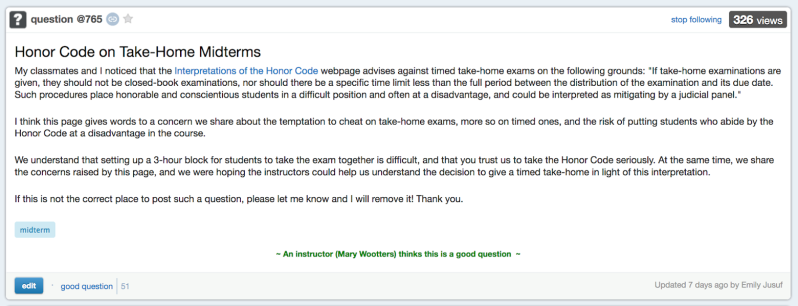A timed take-home midterm in the class CS 161: “Design and Analysis of Algorithms” raised Honor Code questions when a student pointed out that the code’s official interpretations discourage such exams.
The professor in CS 161 — which contains 529 students, according to Explore Courses — assigned a take-home midterm exam between Feb. 10 and Feb. 11 that was required to be completed in a three-hour time frame. However, the Interpretations of the Honor Code web page states that “[i]f take-home examinations are given, they should not be closed-book examinations, nor should there be a specific time limit less than the full period between the distribution of the examination and its due date.”
“Such procedures place honorable and conscientious students in a difficult position and often at a disadvantage,” it adds.
Emily Jusuf ’20, a student in the class, shared her concerns on Piazza, an online platform where students can ask instructors questions.
“We understand that setting up a three-hour block for students to take an exam together is difficult, and that you trust us to take the Honor Code seriously,” she wrote. “At the same time … we were hoping instructors could help us understand the decision to give us a timed take-home midterm in light of [the Interpretations of the Honor Code].”
“It became evident from the responses and the number of ‘good questions’ on the post that a lot of other students in the class shared our concerns,” Jusuf told The Daily in an email.
According to Catherine Sanchez ’19, a first-year sociology Ph.D. candidate who serves as the chair of the Board on Judicial Affairs — a 15-person committee which interprets the Honor Code — a timed take-home midterm violates the Honor Code.
“Take-home exams that are closed-book or timed or in any way require students to ‘police’ themselves create a temptation for students to violate the Honor Code and are, therefore, supposed to be avoided,” she wrote.
“If students were required to time themselves, that would go against the Honor Code,” she added.
Student Affairs spokesperson Pat Harris told The Daily that exams that do not follow Honor Code guidelines may be brought to the Office of Community Standards or the class’ academic department, but said that the University does not confirm student conduct matters.
Computer Science Department Chair John C. Mitchell told The Daily that “no students have reached out to me as the department chair about the midterm.”
In a lecture after the midterm was given, Mary Wooters, an assistant professor of computer science and electrical engineering, acknowledged that she had made a mistake.
“Thank you to those who respectfully pointed out that there is actually some guidance from Stanford about timed take-home midterms,” she wrote in slides presented at the lecture.
In order to address students’ concerns, Wooters chose to alter how students’ grades are calculated.
In an update to the Course Policy, course grades will now be calculated twice, once with the midterm and once without it. The final grade will be a maximum of the two letter grades.
“No one will receive a worse letter grade than they would under the original grading scheme!” Wooters wrote.
However, she told students that she believes they did follow the Honor Code, writing that, “the grade distribution seems about right for a timed exam.”
Wooters did not respond to multiple Daily requests for comment.
Mitchell said he was glad the students and Wooters have reached an agreement.
“The department supports Stanford policy and encourages all faculty to treat students fairly and respectfully, as appears to have occurred in the final agreement,” he said.
But Sanchez expressed concern that the University lacks clear process for handling situations where professors violate the Honor Code.
“It’s tricky because faculty are employees, so if there was a problem with their work behavior, it should be handled by their department,” Sanchez wrote.
She also advocated for incorporating better training of faculty to ensure they have an adequate understanding of the Honor Code. Currently, there is also no centralized place for faculty to ask questions related to the Honor Code other than the Office of Community Standards, and there is no staff person designated for that job, Sanchez said.
“‘Everybody’ knows they can’t proctor, but many people don’t know or think about the nuanced ways that undue temptation can be created!” she wrote.
Jusuf told The Daily she was happy with the way the situation worked out, “especially with Professor Wootters for her understanding and her quick response to change the course policy both this quarter and in future quarters.”
“It’s amazing how we were able to have such an honest and respectful conversation,” she said. “Mistakes happen.”
Riya Sankhe contributed to this article.
Contact Esha Dhawan at edhawan ‘at’ stanford.edu and Emma Talley at emmat332 ‘at’ stanford.edu.
